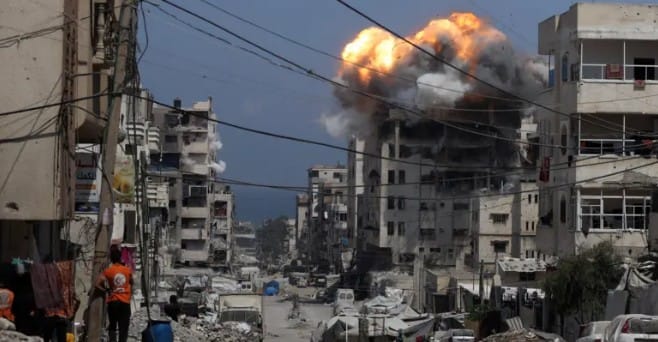“I’m only asking for a piece of bread. That’s all,” cried a 17-year-old boy in Gaza’s Al-Shifa Hospital. His words, both desperate and defiant, encapsulate the humanitarian catastrophe unfolding in Gaza, a region now ravaged not just by war, but by systemic deprivation and environmental degradation that deepens every wound.
A Humanitarian Collapse: International Condemnation Mounts
The UK and 24 other nations have issued a rare and forceful joint statement denouncing Israel’s “drip-feeding” of aid to Gaza and the “horrifying” killing of over 800 Palestinians who were merely trying to access food and water. The coalition warns that the Israeli government’s current approach violates international humanitarian law and fuels long-term instability in the region.
Deir al-Balah, once a humanitarian refuge in central Gaza, is now under direct assault. Tanks roll through its shattered streets, while artillery fire echoes around the displaced and wounded. Aid organisations report that even basic services, clean water, functioning medical facilities, and food distribution, have collapsed under the pressure of constant forced displacement and bombardment.
Starvation as a Weapon
According to the Integrated Food Security Phase Classification (IPC), more than 1.5 million Gazans, two-thirds of the region’s population, face severe malnutrition or starvation. A staggering 500,000 people are already in the IPC’s “catastrophe” category, facing imminent risk of death. With crossings closed and humanitarian corridors blocked or targeted, food is now both a scarcity and a battlefield.
Reports suggest that 19 Palestinians died from starvation in a single 24-hour period. Aid convoys are being attacked, civilians gunned down as they approach relief trucks, and hospitals are incapable of treating malnourished patients.
This is not merely collateral damage, it is a humanitarian strategy under scrutiny by global powers and human rights groups.
Climate Change: The Invisible Multiplier of Gaza’s Suffering
While war dominates the headlines, a silent threat compounds the suffering: climate change. Gaza’s environment has long been under siege. Droughts, coastal erosion, and declining freshwater tables due to rising sea levels have made access to clean water almost impossible. Agriculture, once a small buffer against dependency, is nearly extinct. Climate-related stressors have undermined food production and accelerated reliance on external aid that is now weaponised.
According to the UN, climate-vulnerable areas like Gaza are disproportionately affected during armed conflict, especially when combined with enforced displacement and collapsing infrastructure. Israel’s bombardments of desalination plants, waste treatment facilities, and agricultural zones exacerbate this reality.
As the global climate crisis worsens, Gaza becomes a case study in how ecological collapse and geopolitical violence can coalesce into mass human suffering.
Moral Crossroads: War, Justice, and the Role of the Global Community
International outrage continues to build, with the Pope, Save the Children, and the World Food Programme among those condemning Israel’s actions. Yet condemnation alone is not enough.
The statement from 25 countries was clear: proposals to forcibly transfer Palestinians into “humanitarian cities” are a violation of international law. Forced demographic change, settlement expansion, and the denial of food and water are acts with long-term consequences that extend far beyond this war.
Meanwhile, hostages taken by Hamas on October 7, 2023, remain unaccounted for. Their families are demanding accountability from the Israeli government, even as military actions risk their lives. The tragedy on both sides only reinforces the urgency for an immediate and unconditional ceasefire, one that protects civilians, restores dignity, and lays the groundwork for justice.
Gaza Is a Mirror
Gaza stands at the crossroads of human cruelty and climate fragility. It reveals how political inaction, military extremism, and ecological negligence intertwine. This is no longer just a war zone, it is a moral barometer of our age.
The world must act, not only to stop the war but to recognise and address the climate-driven roots of humanitarian collapse. Without that, we are doomed to repeat the same cycles of destruction, each more brutal than the last.




